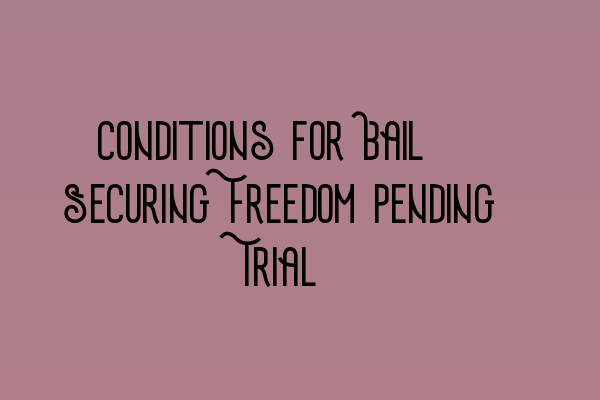Conditions for Bail: Securing Freedom Pending Trial
Being accused of a crime can be a distressing experience, but it is important to remember that everyone is entitled to the presumption of innocence until proven guilty. This means that individuals facing criminal charges have the right to apply for bail and secure their freedom while awaiting trial. In this article, we will explore the concept of bail, the conditions that may be imposed, and the process of securing release.
What is Bail?
Bail is a legal concept that allows a person accused of a crime to be released from custody while awaiting trial, provided certain conditions are met. It is designed to strike a balance between ensuring the accused person’s appearance in court and allowing them to maintain their freedom until the resolution of their case.
When considering a bail application, the court takes various factors into consideration, including the severity of the alleged offense, the individual’s criminal history, ties to the community, and the likelihood of flight or interference with witnesses. In some cases, bail may be denied if the court believes there is a significant risk that the accused person may fail to appear or pose a danger to others.
Conditions for Bail
When granting bail, the court may impose a range of conditions to ensure the accused person’s compliance with the law and the safety of the community. These conditions can vary depending on the specific circumstances of the case but are generally aimed at reducing the risk of further criminal activity or obstruction of justice.
Common conditions for bail include:
- Reporting to a designated police station: The accused person may be required to regularly report to a specific police station to provide updates on their whereabouts.
- Surrendering passports: In cases where there is a risk of flight, the court may order the accused person to surrender their passport to prevent them from leaving the country.
- Restraining orders: If the alleged offense involves harassment or violence, the court may impose a restraining order to protect the alleged victim.
- Curfews: The court may impose a curfew, restricting the accused person’s movement during specific hours to ensure they do not engage in criminal activities.
- Prohibition from contacting certain individuals: If there is a risk of witness interference, the court may prohibit the accused person from contacting specific individuals involved in the case.
These are just a few examples of the conditions that may be imposed. The specific conditions will depend on the unique circumstances of each case and are determined by the court after careful consideration.
Securing Release
To secure bail, an accused person or their legal representative must submit a bail application to the court. This application will outline the reasons why bail should be granted and the proposed conditions for release.
It is essential to provide strong supporting evidence and arguments to increase the chances of a successful bail application. Consulting with an experienced criminal law solicitor who specializes in bail applications can significantly enhance your chances of securing release.
At SQE Criminal Law & Practice Law UK, our team of expert solicitors has extensive experience in navigating the complexities of the bail process. We understand the importance of securing freedom pending trial and will work tirelessly to build a strong case on your behalf.
If you require guidance or representation in a bail application, do not hesitate to reach out to us for a confidential consultation. Our solicitors are well-versed in the latest updates in UK criminal laws and can provide the necessary support to help you navigate the legal system successfully.
In addition, we offer workshops and seminars on criminal practice to help expand your expertise in this area. These events provide valuable insights into best practices, recent developments, and effective strategies for handling criminal cases. To learn more, visit our article on Workshops and Seminars on Criminal Practice: Expanding Your Expertise.
Staying informed and updated on UK criminal laws is crucial for legal professionals and individuals involved in the criminal justice system. To learn about the latest changes and developments, read our comprehensive article on Updates in UK Criminal Laws: Staying Informed and Prepared.
Enhancing your SQE criminal law study group experience can significantly contribute to your understanding and preparation for a career in criminal law. For tips and strategies to enhance your study group dynamics, check out our article on Enhancing Your SQE Criminal Law Study Group Experience.
Decoding criminal evidence rules is essential for building a strong defense or prosecuting a case effectively. To gain a detailed analysis of criminal evidence rules in the UK, read our comprehensive article on Decoding Criminal Evidence Rules: A Detailed Analysis.
Protecting the rights of victims in criminal procedures is of paramount importance. To understand the legal protections and support available to victims, refer to our article on Ensuring Rights of Victims in Criminal Procedures: Legal Protections and Support.
Remember, facing criminal charges can be overwhelming, but you don’t have to navigate the complexities of the legal system alone. Contact our team at SQE Criminal Law & Practice Law UK for expert advice and representation. We are committed to fighting for your rights and securing the best possible outcome for your case.
